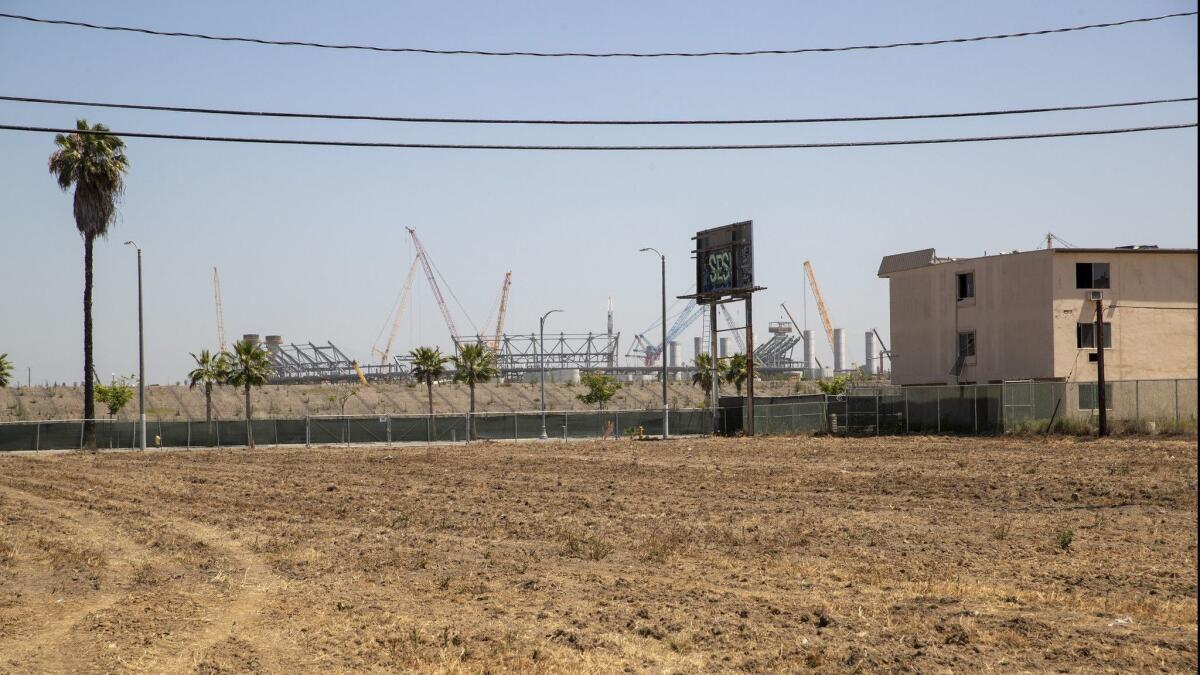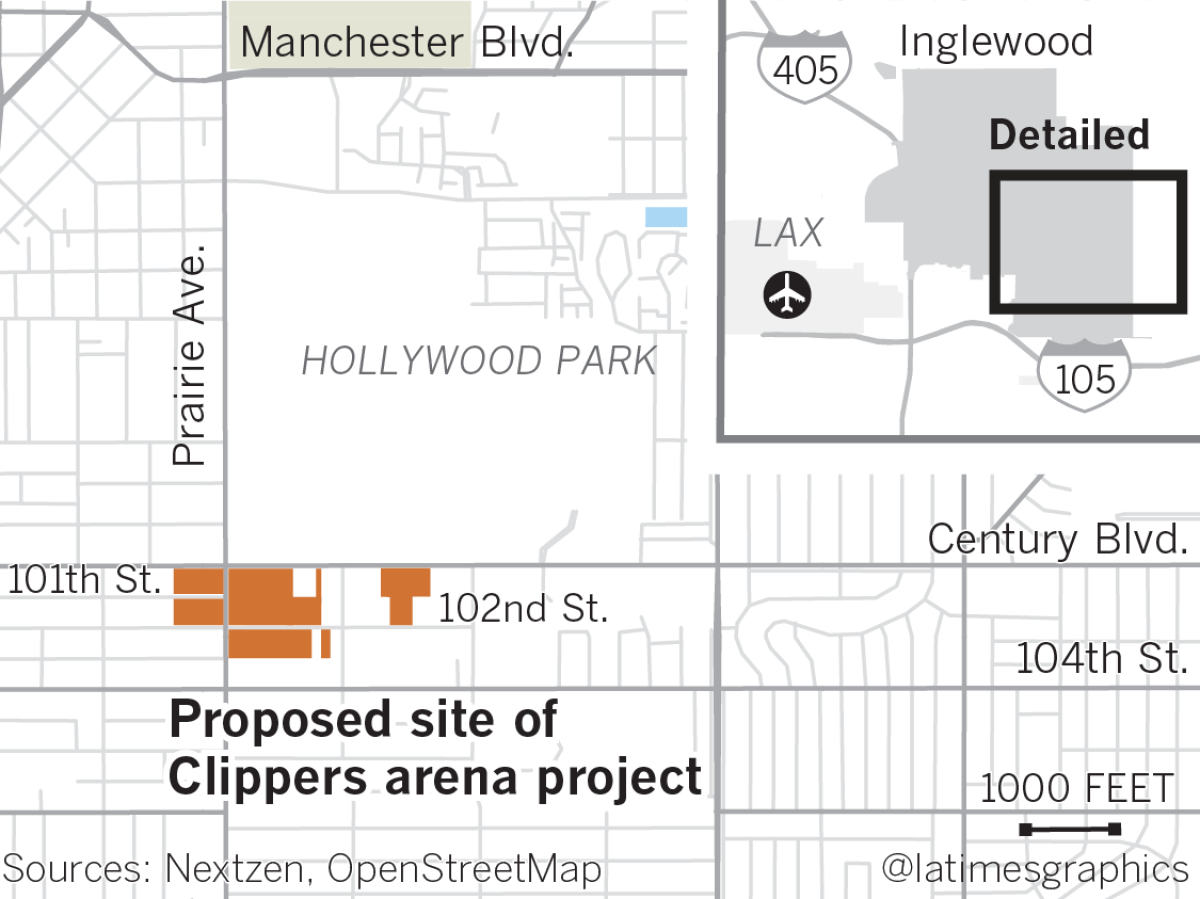Fast break for Clippers arena: Bill putting time limit on environmental challenges sails through

- Share via
The Clippers’ bid to streamline construction of a new arena in Inglewood won overwhelming approval Friday when lawmakers sent Gov. Jerry Brown a bill granting the project protection against drawn-out environmental litigation.
Amendments crafted on the Senate floor this week, including a $30-million environmental fund aimed at reducing pollution in Inglewood and surrounding areas, cleared the way for a bill that was heavily contested in committee hearings.
After sailing through on a 34-0 vote in the Senate just after noon Friday, the bill was then approved 59 to 0 in the Assembly only hours before the Legislature adjourned for the year.
A similar bill that would benefit a potential new ballpark for the Oakland Athletics also breezed through both chambers, clearing the Assembly 60 to 2 on Friday.
If signed by Brown, both bills would set a nine-month window for lawsuits, including appeals, to be concluded under California’s environmental laws. They would also require the projects to implement measures to reduce greenhouse gases and promote public transportation.
The California Environmental Quality Act requires developers to disclose and reduce the environmental effects of their projects, and lawsuits challenging their environmental reports are often able to tie up or kill proposals.
The Clippers and Oakland A’s are seeking to join seven other proposed sports facilities that obtained legislative protection from such litigation, including arenas for the Golden State Warriors and Sacramento Kings and three football stadiums in Los Angeles that were never built.
The requirement that projects reduce pollution and greenhouse gas emissions using no taxpayer dollars goes beyond any previous legislation.
Before the vote, a handful of legislators lauded the bill as good for Inglewood and the environment.
“This is not just about basketball, my friends,” said Sen. Steven Bradford (D-Gardena). “It’s about creating jobs and economic equity in a city that has been marginalized.”
“I think that the environmental elements, the economic impacts are going to be extraordinary,” Sen. Bob Hertzberg (D-Van Nuys) said.
The Clippers say they needed the assurance of swift resolution of any challenges to allow for construction to be completed by 2024, when the team’s current lease at Staples Center expires.
In a statement after the vote, Clippers owner Steve Ballmer praised legislators for moving the team “one step closer to bringing the world’s best basketball arena to a community that deserves the best.”
He promised to be “exceptional neighbors who care passionately about the Inglewood community and its citizens.”
Though the Clippers have not presented formal plans for the project, Mayor James T. Butts and other local officials have been enthusiastic supporters of the bill in the hope of advancing their plan to make the city home to three professional sports teams.
The Rams and Chargers of the National Football League are already due to start the 2020 season in a new stadium under construction just to the north of the site of the former Hollywood Park racetrack. That stadium project avoided environmental review when the Inglewood City Council approved an initiative in support of it that qualified for the ballot.
Opponents of the legislation, who have already filed several lawsuits against the Clippers arena, won several concessions from what was initially a more sweeping bill. It would have applied the legal protection to all of the Hollywood Park property and barred judges from stopping construction for any reason other than life and safety risks or the disruption of Native American artifacts.
The adopted version encompasses only the arena, training and sports medicine facilities, parking facilities, offices, restaurants, retail and community space and a hotel. The hotel, a Rodeway Inn, will be relocated from the arena site to another part of the project, a spokesman for the development said.
Owners of Inglewood’s Forum, which would compete with any Clippers facility in the city, issued a statement crediting hundreds of Inglewood residents and Senate committee members for helping to “fix irresponsible legislation designed to gut vital community protections provided by the California Environmental Quality Act.”
But the Forum still opposes the arena proposal, which it said would “harm an established low-income community, likely resulting in the loss of affordable housing and creating significant traffic, air quality and other impacts on the neighborhood.”
Others also continued to criticize the bill to the end, protesting that many of the amendments, including the $30-million cleanup fund, had been jammed into the bill in the final days of the legislative session with no public discussion.
“This is all being done behind closed doors without the benefit of any public involvement,” said Douglas Carstens of the Chatten-Brown and Carstens law firm, which has filed two lawsuits against the proposal on behalf of an Inglewood residents’ group. “There hasn’t even been an attempt at engagement or consultation with the community about a bill that will directly impact thousands of lives.”
Among the last-minute changes, the bill dropped language specifically excluding existing litigation from the nine-month window for environmental challenges — a move Carstens attributed to “closed-door, smoke-filled room lobbying.” Supporters say it was superfluous because new laws do not apply retroactively.

Countering the opposition, the bill’s author, Assemblywoman Sydney Kamlager-Dove (D-Los Angeles) last week released a list of supporters including dozens of Inglewood residents and organizations, labor unions, members of the California Legislative Black Caucus, four Los Angeles County supervisors and the South Bay Cities Council of Governments.
Assembly Bill 987 started as a close copy of an earlier bill sponsored by Bradford that died in committee last year. That bill failed after furious lobbying by Madison Square Garden Co., owner of the Forum. This year, MSG sued the city of Inglewood and a Clippers-controlled company over the arena plans..
Bradford is the co-author of the new bill, which marks Kamlager-Dove’s first legislation since being elected in April to fill the remaining term of Sebastian Ridley-Thomas, who resigned citing unspecified health reasons.
Kamlager-Dove unveiled the bill in June flanked by Ballmer, Clippers coach Doc Rivers and consultant Jerry West along with Butts.
She said she embraced the Clippers’ proposal, though it had not been an issue in her campaign and falls outside her district, because, “I’m happy to carry a bill that focuses on job creation, economic development and expanding a tax base.”
Her 54th Assembly District includes Culver City and Los Angeles neighborhoods of Mar Vista, Westwood, Baldwin Hills and Mid-City, but only a four-block area in Inglewood with about 100 homes.
Before Friday’s Assembly vote, Kamlager-Dove said the bill was never about building a basketball arena but bringing “millions of dollars for public services and billions of dollars in indirect and direct economic benefits” to Inglewood and the surrounding areas she represents.
“How do you help a community?” she asked. “You bring dignity and jobs. That is exactly what AB 987 will do.”
The bill requires the Clippers to employ a “skilled and trained workforce,” 30% hired locally, and pay prevailing wages.
The new language also requires the Clippers to reduce greenhouse gas emissions, exceeding the requirement in the initial bill and other previous legislation that the project not increase them.
The Oakland A’s bill, AB 734 from Assemblyman Rob Bonta (D-Alameda), was also amended to require a reduction in greenhouse gas emissions in the project area.
The Clippers bill went further, also requiring the reduction of pollutants with a goal of removing 400 tons of oxides of nitrogen and 10 tons of small particulate matter in a decade.
Payments to other parties to reduce emissions elsewhere could be used to account for only half that goal. Other measures could include onsite electrical generation, funding transit improvements and paying to retrofit existing buildings for energy efficiency.
Costs in meeting that condition would be credited to the $30-million environmental fund.
It requires a traffic management plan to reduce vehicle trips by employees and visitors by 15% compared with what they would have been by 2030. Joe Lang, the project’s lobbyist, said the distant deadline was needed because of the lack of existing transportation infrastructure around Inglewood.
The expansive scope of the initial bill, including 298 acres north of Century Boulevard owned by the Hollywood Park Land Co. and Rams owner Stan Kroenke, had brought intense opposition, including from a Native American tribe concerned about possible expansion of the Hollywood Park Casino whose owner, Christopher Meany, is the Clippers’ project manager.
Scott Govenar, a lobbyist representing the Morongo Band of Mission Indians, who also represented Madison Square Garden, told The Times the tribe was worried the bill could help introduce Las Vegas-style gaming at Hollywood Park, a use provided for in the city’s general plan.
Acknowledging the tribe’s opposition, Lang agreed to have the larger section of the property removed from the area covered by the measure and instead offered a list of 79 parcels totaling about 35 acres with adjoining streets.
Later, in the Senate Appropriations Committee, an amendment was added expressly to exclude construction of a new gaming establishment from the bill’s protection.
Two residents groups have filed suits alleging that in executing a 2017 exclusive negotiating agreement with a Clippers-controlled company for the arena development, the city ignored other uses for the city-owned land that will make up the bulk of the project.
“It may be the arena is the only thing that works there, but they need to go through that process without prejudging it,” Carstens said.
More to Read
Sign up for Essential California
The most important California stories and recommendations in your inbox every morning.
You may occasionally receive promotional content from the Los Angeles Times.












